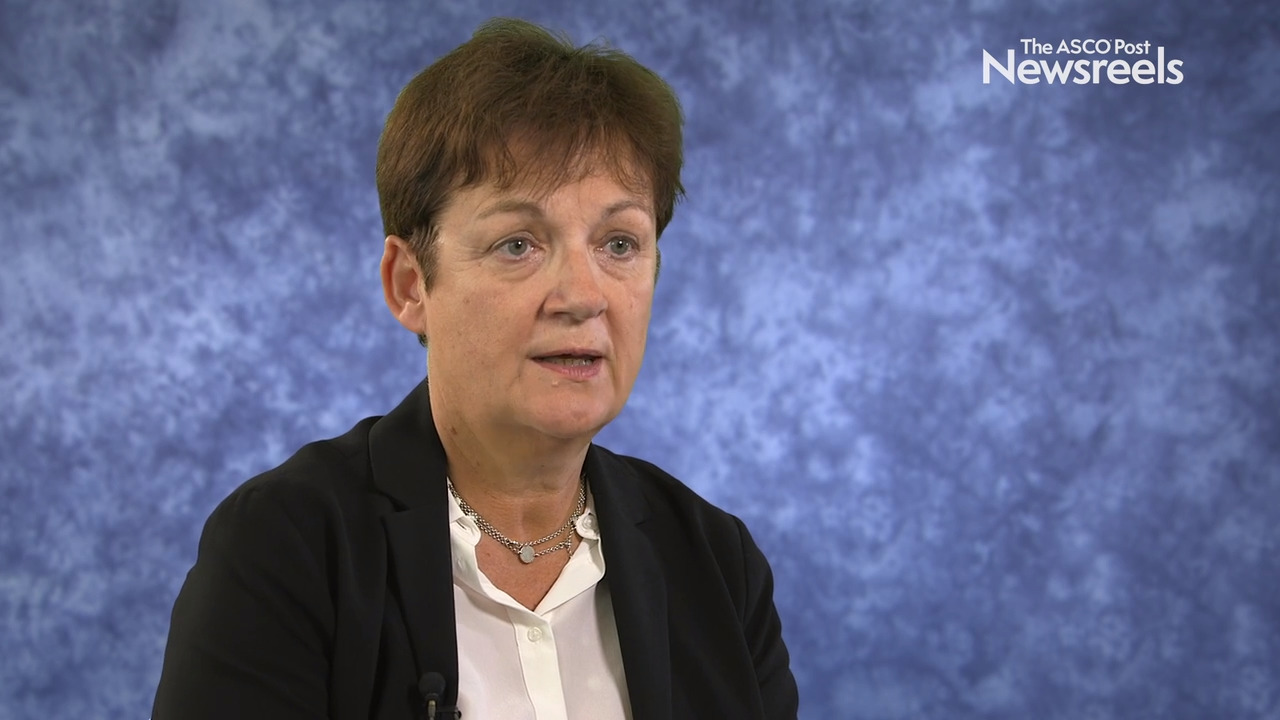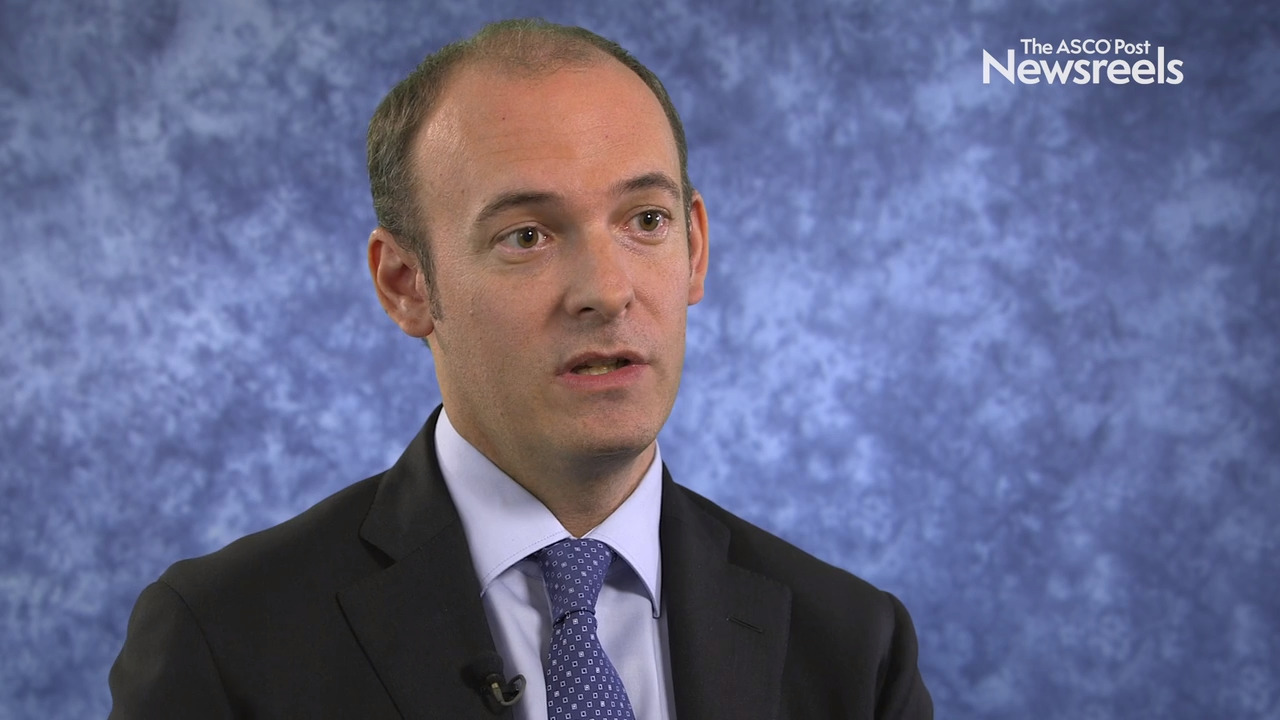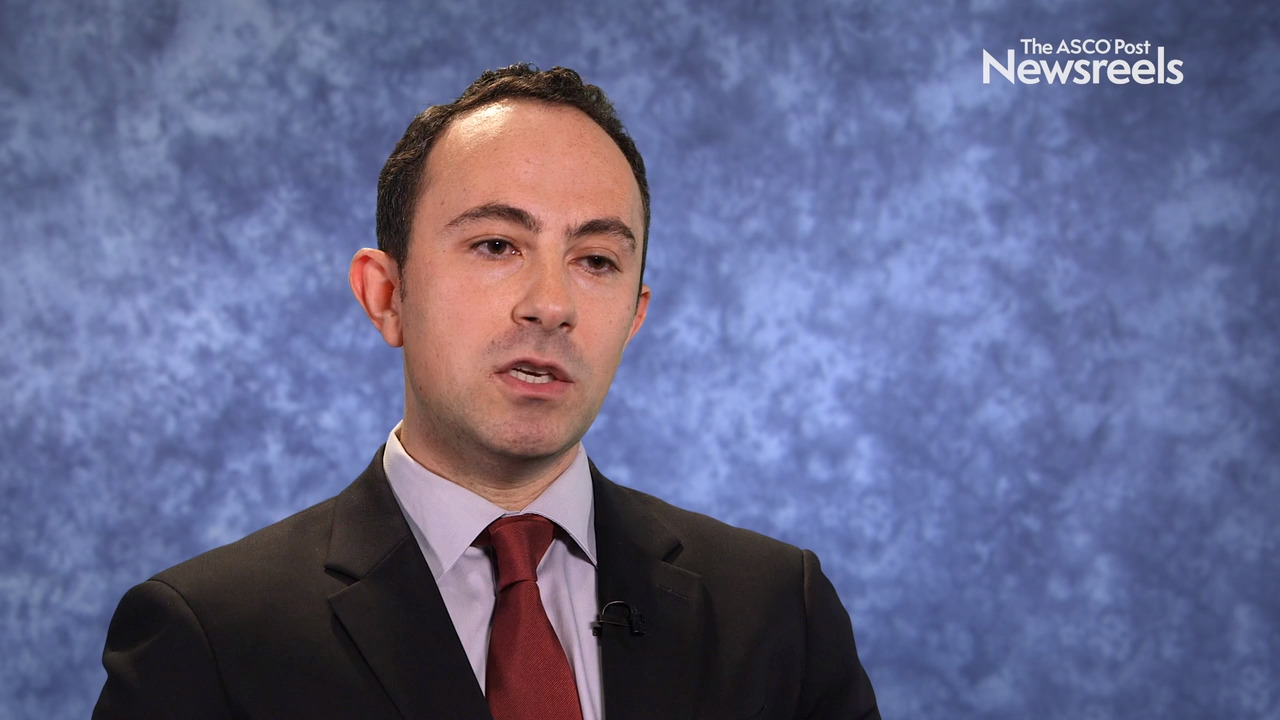Factors in Genetic Testing Decisions Among Women With a Personal and Family History of Breast Cancer
In a study reported in the Journal of Oncology Practice, Scott et al identified several factors that motivated breast cancer survivors with high genetic risk to undergo genetic testing and found that clinicians often failed to discuss all relevant factors in decision-making. Study Details The...
Landmark Studies Show Clear Overall Survival Benefit for CDK4/6 Inhibitors in Advanced Breast Cancer
CDK4/6 inhibitors clearly improve overall survival in advanced breast cancer, as this prized endpoint was robustly demonstrated in two landmark phase III trials reported at the European Society for Medical Oncology (ESMO) Congress 2019. Dennis J. Slamon, MD, PhD, of the University of California,...
Phase III Evidence Supports Neoadjuvant Immunotherapy Plus Chemotherapy for Early Triple-Negative Breast Cancer
Immunotherapy has changed the treatment paradigms for melanoma, lung cancer, bladder cancer, and renal cancer. Now, checkpoint inhibitor therapy is making inroads in triple-negative breast cancer—one of the most difficult-to-treat aggressive types of breast cancer. The addition of the checkpoint...
Pooled Analysis of Outcomes in Older Women With Metastatic Breast Cancer Receiving CDK4/6 Inhibitor Plus Aromatase Inhibitor Therapy
In a U.S. Food and Drug Administration (FDA) pooled analysis reported in the Journal of Clinical Oncology, Howie et al found that progression-free survival and benefit were similar for older vs younger postmenopausal women treated with combined cyclin-dependent kinase 4/6 (CDK4/6) plus aromatase...
Deviation From NCCN Guidelines May Result in Greater Costs for Patients With Metastatic Breast Cancer
A study published by Williams et al in JNCCN—Journal of the National Comprehensive Cancer Network found that direct costs for patients with metastatic breast cancer increased when their treatment differed from recommendations found in the NCCN Clinical Practice Guidelines in Oncology® (NCCN...
ASCO Breakthrough: Breast Cancer Gene-Expression Signature May Help Predict Recurrence Postradiotherapy
Researchers have identified a gene pattern that may help predict which patients with breast cancer will have early or late disease recurrence following radiation therapy. The ability to predict the timing of recurrence could change—and improve—treatment strategies and determine the length of...
Recent Trends in the Treatment and Prognosis of Male Breast Cancer
A recent analysis published by Yadav et al in Cancer reviewed how the treatment of male breast cancer has evolved over the years 2004 to 2014. In addition, certain patient-, tumor-, and treatment-related factors were found to be linked with better survival. Male breast cancer comprises 1% of all...
FDA Pipeline: Advances in Prostate Cancer, Urothelial Cancer, Myelofibrosis, and More
In the past few weeks, the U.S. Food and Drug Administration (FDA) has issued regulatory decisions in prostate cancer, urothelial cancer, myelofibrosis, breast cancer, pediatric brain cancer, leukemia, and skin cancer. Breakthrough Therapy Designation for Niraparib in Metastatic...
Addition of Ovarian Function Suppression to Ongoing Tamoxifen in Premenopausal Breast Cancer
In a phase III trial reported in the Journal of Clinical Oncology, Kim et al found that the addition of 2 years of ovarian function suppression during ongoing tamoxifen treatment improved disease-free survival vs 5 years of tamoxifen alone in patients with estrogen receptor–positive breast cancer...
ESMO 2019: BROCADE 3: Veliparib Plus Carboplatin/Paclitaxel in Patients With HER2-Negative, Germline BRCA-Mutated Advanced Breast Cancer
Patients with advanced or metastatic HER2-negative breast cancer with a germline BRCA mutation demonstrated significantly improved progression-free survival (PFS) with the addition of the poly (ADP-ribose) polymerase (PARP) inhibitor veliparib to chemotherapy (comprised of carboplatin/paclitaxel)...
Véronique Diéras, MD, on HER2-Negative, BRCA-Mutated Breast Cancer: Veliparib Plus Carboplatin/Paclitaxel
Véronique Diéras, MD, of Institut Curie Paris & Saint Cloud, discusses results from the phase III BROCADE 3 trial, which investigated the PARP inhibitor veliparib in combination with carboplatin/paclitaxel in patients with advanced HER2-negative, germline BRCA–mutated breast cancer (Abstract LBA9).
Sherene Loi, MD, PhD, and Leisha A. Emens, MD, PhD, on HER2-Positive Breast Cancer: KATE2 Study of Atezolizumab/Trastuzumab Emtansine
Sherene Loi, MD, PhD, of Peter MacCallum Cancer Centre at the University of Melbourne, and Leisha A. Emens, MD, PhD, of UPMC Hillman Cancer Center, discuss overall survival in this phase II study of atezolizumab/trastuzumab emtansine (T-DM1) vs placebo/T-DM1 in previously treated HER2-positive advanced breast cancer (Abstract 305O).
Aleix Prat, MD, PhD, on a HER2-Positive Breast Cancer Biomarker: Results From the PAM50 Trial
Aleix Prat, MD, PhD, of Hospital Clinic de Barcelona, discusses the findings of a meta-analysis showing that the HER2-E subtype may predict pathologic complete response beyond hormone receptor status in HER2-positive early breast cancer (Abstract 248P).
Peter Schmid, MD, PhD, on Triple-Negative Breast Cancer: KEYNOTE-522 Trial of Pembrolizumab Plus Chemotherapy
Peter Schmid, MD, PhD, of Queen Mary University of London Barts Cancer Institute, discusses pathologic complete response data from a phase III study of pembrolizumab/chemotherapy vs placebo/chemotherapy as neoadjuvant treatment, followed by pembrolizumab vs placebo as 6-month adjuvant treatment for early triple-negative breast cancer (Abstract LBA8).
AACR Disparities: Uninsured/Underinsured, Lower-Income, and/or Minority Patients More Likely to Receive Cancer Diagnosis After ED Visit
Medicare patients from lower socioeconomic groups and several ethnic minority groups were more likely to be diagnosed with cancer following an emergency department visit, according to results of a study presented at the 12th American Association for Cancer Research Conference on The Science of...
Youssef Zeidan, MD, PhD, on HER2-Positive Breast Cancer: HERA Trial on Postmastectomy Radiation Therapy
Youssef Zeidan, MD, PhD, of the American University of Beirut Medical Center, discusses study findings showing that, in patients with one to three positive lymph nodes, postmastectomy radiation treatment decreased the risk of locoregional recurrence, particularly in estrogen receptor–positive disease (Abstract 83).
Two Studies Show Variation in Effectiveness of Mammography Across Populations
Two recent studies showed varying degrees of the effectiveness of mammography in different populations. In a report published in Radiology, Gao et al showed that in men at high risk for breast cancer, screening mammography may be able to increase the rate of detection of early-stage disease....
Canadian Cancer Organizations Team Up to Focus on New Approach to Metastatic Breast Cancer
At a press conference at McGill University, Stand Up To Cancer Canada (SU2C Canada), the Canadian Cancer Society (CCS), and the Canadian Institutes of Health Research (CIHR) announced the launch of the SU2C Canada Metastatic Breast Cancer Dream Team to pursue the development of a new drug...
FDA Issues Drug Safety Communication on Lung Inflammation Due to Treatment With CDK4/6 Inhibitors
On September 13, the U.S. Food and Drug Administration (FDA) issued a drug safety communication warning that palbociclib, ribociclib, and abemaciclib—used to treat some patients with advanced breast cancer—may cause rare but severe inflammation of the lungs. The agency approved new warnings about...
Home-Based Exercise and Weight Loss Programs for Lymphedema Management in Overweight Breast Cancer Survivors
As reported in JAMA Oncology by Schmitz et al, the WISER Survivor trial showed no benefit of home-based exercise and weight loss programs on lymphedema outcomes vs facility-based lymphedema care among overweight breast cancer survivors. Study Details In the trial, 351 overweight breast cancer...
Meta-analysis of Chemotherapy and Hormonal Treatments for Postmenopausal Women With Metastatic Breast Cancer
In a systematic review and network meta-analysis reported in The Lancet Oncology, Giuliano et al found that progression-free survival in postmenopausal women with hormone receptor (HR)-positive, HER2-negative metastatic breast cancer was improved with first- or second-line CDK4/6 inhibitors plus...
T-DM1 Plus Neratinib in Metastatic HER2-Positive Breast Cancer
In the phase Ib NSABP Foundation Trial FB-10 reported in the Journal of Clinical Oncology, Jame Abraham, MD, and colleagues found evidence of activity of the combination of ado-trastuzumab emtansine (T-DM1) plus neratinib in metastatic HER2-positive breast cancer and identified the dose of the...
USPSTF Recommendation on Risk Assessment, Genetic Counseling, and Genetic Testing for BRCA-Related Cancer
As reported in JAMA, the U.S. Preventive Services Task Force (USPSTF) recommended risk assessment and, if indicated, genetic counseling and testing for potentially harmful BRCA1/2 mutations in women with a personal or family history of breast, ovarian, tubal, or peritoneal cancer or who have...
Circulating Tumor DNA and Relapse in Early-Stage Breast Cancer
In a study reported in JAMA Oncology, Nicholas C. Turner, PhD, and colleagues found that detection of circulating tumor DNA (ctDNA) during follow-up after initial treatment for early breast cancer was associated with a high risk of relapse. Detection at diagnosis was also associated with poorer...
Combined Use of Identification Methods for Dense Breasts and Discussion of Supplemental Imaging
In a study reported in JAMA Internal Medicine, Karla Kerlikowske, MD, and colleagues found that the combined use of Breast Imaging Reporting and Data System (BI-RADS) breast density and Breast Cancer Surveillance Consortium (BCSC)-defined risk for breast cancer may be an effective way of...
Alpelisib for PIK3CA-Mutated Advanced Breast Cancer
On May 24, 2019, alpelisib was approved for use in combination with fulvestrant for postmenopausal women, and men, with hormone receptor–positive, HER2-negative, PIK3CA-mutated advanced or metastatic breast cancer, as detected by a U.S. Food and Drug Administration (FDA)-approved test following...
Insightful Advice From a College Advisor Leads to an Unexpected Career in Oncology
For this installment of the Living a Full Life series, guest editor Jame Abraham, MD, FACP, spoke with Tatiana M. Prowell, MD, who currently serves as Associate Professor of Oncology in the Breast Cancer Program at the Johns Hopkins Kimmel Comprehensive Cancer Center and as a Medical Officer and...
Menopausal Hormone Therapy Use and Risk of Breast Cancer
In a study reported in The Lancet, the Collaborative Group on Hormonal Factors in Breast Cancer found that the use of menopausal hormone therapy is associated with an increased risk of breast cancer, with risk increasing as the duration of use increases, in both current and past users. Study...
Pregnancy Appears Safe After Treatment for Breast Cancer in Patients With BRCA Mutations
Pregnancy after breast cancer appears to be safe in patients with germline BRCA mutations—and particularly among those with BRCA1 mutations—according to new research. Limited data are available on the safety of pregnancy and reproductive outcomes in patients with breast cancer and BRCA mutations,...
Neoadjuvant Talazoparib for Operable BRCA-Mutated Breast Cancer
In a study reported in the Journal of Clinical Oncology, Jennifer K. Litton, MD, and colleagues found that 6 months of neoadjuvant talazoparib therapy resulted in a high rate of residual cancer burden (RCB) of 0 (pathologic complete response) in patients with stage I–III breast cancer with germline ...
Pyrotinib or Lapatinib With Capecitabine in Previously Treated HER2-Positive Metastatic Breast Cancer
In a Chinese phase II trial reported in the Journal of Clinical Oncology by Ma et al, the combination of the pan-ErbB inhibitor pyrotinib and capecitabine improved response rate vs lapatinib/capecitabine in women with HER2-positive relapsed or metastatic breast cancer previously treated with...
FDA Issues Draft Guidance Encouraging Inclusion of Male Patients in Breast Cancer Clinical Trials
A draft guidance issued by the U.S. Food Drug Administration (FDA) on August 26 includes draft recommendations for the inclusion of male patients in breast cancer clinical trials. Historically, males either have not been included in clinical trials for drugs to treat breast cancer, or inclusion of...
Tumor Size and Grade Matter, and Ovarian Ablation by Chemotherapy May Explain Subgroup Anomaly in TAILORx
At the 2019 ASCO Annual Meeting, and simultaneously in The New England Journal of Medicine, we heard the third paper reporting results from TAILORx.1,2 The first, in 2015,3 indicated that women with node-negative breast cancers with Oncotype DX recurrence scores less than 11 did extremely well...
Expert Point of View: Carla S. Fisher, MD
CARLA S. FISHER, MD, Medical Director of Breast Surgical Oncology and Associate Professor of Surgery at Indiana University School of Medicine, Indianapolis, commented on the study that sought to identify HER2- positive patients who do, and do not, need surgery after neoadjuvant chemotherapy. “As...
Can Some Women With HER2-Positive Breast Cancer Forgo Surgery?
Breast cancer researchers at The University of Texas MD Anderson Cancer Center, Houston, are beginning to select patients with HER2-positive breast cancer who might forgo surgery after neoadjuvant chemotherapy. While this fine-tuning is currently intended to inform clinical trials—in particular, to ...
Almost 20 Years Later, Breast Fitness Is More Relevant Than Ever
BOOKMARK Title: Breast Fitness: An Optimal Exercise and Health Plan for Reducing Your Risk of Breast CancerAuthors: Anne McTiernan, MD, PhD; Julie Gralow, MD; and Lisa TalbottPublisher: St. Martin’s PressPublication Date: October 2000 (first edition)Price: $48.75, hardcover, 352 pages The...
USPSTF Recommendation on Risk Assessment, Genetic Counseling, and Genetic Testing for BRCA-Related Cancer
As reported in JAMA, the U.S. Preventive Services Task Force (USPSTF) recommended risk assessment and, if indicated, genetic counseling and testing for potentially harmful BRCA1/2 mutations in women with a personal or family history of breast, ovarian, tubal, or peritoneal cancer or who have...
Total Cumulative Chemotherapy Dose and Survival in Breast Cancer
Physicians should attempt to maintain full doses of chemotherapy, especially early in the course of treatment, for patients with intermediate- or high-risk breast cancer, according to research published by Veitch et al in JNCCN—Journal of the National Comprehensive Cancer Network. The...
Neoadjuvant Letrozole Plus Taselisib or Placebo in Postmenopausal Women With ER-Positive, HER2-Negative Early Breast Cancer
In the phase II LORELEI trial reported in The Lancet Oncology, Saura et al found that the addition of the phosphatidylinositol-3 kinase (PI3K) inhibitor taselisib to neoadjuvant letrozole improved objective response rates but not pathologic complete response rates in women with estrogen receptor...
Circulating Tumor DNA and Relapse in Early-Stage Breast Cancer
In a study reported in JAMA Oncology, Garcia-Murillas et al found that detection of circulating tumor DNA (ctDNA) during follow-up after initial treatment for early breast cancer was associated with a high risk of relapse. Detection at diagnosis was also associated with poorer relapse-free...
FDA Approves Entrectinib for NTRK-Fusion Cancers, ROS1-Positive NSCLC
Today, the U.S. Food and Drug Administration (FDA) granted accelerated approval to entrectinib (Rozlytrek) for adult and adolescent patients whose cancers have an NTRK (neurotrophic tyrosine receptor kinase) genetic fusion and for whom there are no effective treatments. Entrectinib was also...
Adiposity Distribution and Risk for Cardiovascular Disease Among Breast Cancer Survivors
In a study reported in the Journal of Clinical Oncology, Cespedes Feliciano et al found that increased visceral and intramuscular adiposity were associated with increased risk of cardiovascular disease among breast cancer survivors, independent of baseline risk factors and cancer treatment. Study...
Circulating Tumor DNA Analysis for Detection of Residual Disease in Breast Cancer
Researchers have developed a new method for tracking residual disease in patients with breast cancer that could one day help doctors better tailor treatments and prevent unnecessary surgeries for some people with the disease. Findings were published by McDonald et al in Science Translational...
How Laura J. van ’t Veer, PhD, Became an Expert in Genetic Testing for Breast Cancer
Breast cancer researcher and innovator Laura J. van ’t Veer, PhD, was born and reared in Amsterdam in 1957. “During high school, I had a wonderful biology teacher who was going through his own biology studies at the University of Amsterdam, and he was bringing that university-level education into...
Notable Presentations at ASCO 2019 Included Studies in Sarcoma, Lymphoma, Myeloma, and Breast and Kidney Cancers
The 2019 ASCO Annual Meeting featured a wealth of presentations on important topics. In addition to our regular news coverage of the meeting, we present below some highlights of other studies that add to our knowledge base for treatment of various cancers. Olaratumab in Soft-Tissue Sarcoma...
How Treatment Costs Affect Decisions for Breast Cancer Surgery
In a study reported in the Journal of Oncology Practice, Greenup et al found that cancer treatment costs influenced women’s decisions on breast cancer surgery. Researchers reported many women, even at the highest income levels, said that costs were higher than expected, and that most women...
AI May Improve Efficiency and Accuracy of Digital Breast Tomosynthesis
Artificial intelligence (AI) may improve the efficiency and accuracy of an advanced imaging technology used to screen for breast cancer, according to a study published by Conant et al in Radiology: Artificial Intelligence. Digital breast tomosynthesis is an advanced method for cancer...
Ten-Year Update on Standard Adjuvant Chemotherapy vs Capecitabine in Older Women With Early Breast Cancer
As reported in the Journal of Clinical Oncology by Muss et al, long-term findings from the phase III CALGB 49907 trial support the finding from the primary analysis—that standard adjuvant chemotherapy improved recurrence-free survival vs capecitabine in women aged 65 years or older with early ...
Overall Survival With the Addition of Ribociclib to Endocrine Therapy in Advanced HR-Positive, HER2-Negative Breast Cancer
As reported in The New England Journal of Medicine by Im et al, an interim analysis of the phase III MONALEESA-7 trial has shown an overall survival benefit with the addition of the cyclin-dependent kinase 4 and 6 (CDK4/6) inhibitor ribociclib to endocrine therapy in pre- or perimenopausal women...
Automated Breast Cancer Detection Assay Using Fine-Needle Aspiration May Aid Patients in Developing Countries
A new laboratory test developed to identify chemical changes to a group of cancer-related genes may be able to accurately detect which breast tumors are cancerous or benign. Such a test could result in a more timely diagnosis of breast cancer for women in developing countries with less access to...





